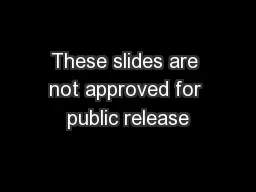PPT-R6.3 Requirements Point Release
Author : maisie | Published Date : 2022-04-07
Change Summary February 2021 Summary of Changes Type Adders Notes Deleted 0 0 New 1 3 Modified 0 0 Reworded 3 1 Terminology 0 0 Renumbered Only 0 0 Moved 0 0 Combined
Presentation Embed Code
Download Presentation
Download Presentation The PPT/PDF document "R6.3 Requirements Point Release" is the property of its rightful owner. Permission is granted to download and print the materials on this website for personal, non-commercial use only, and to display it on your personal computer provided you do not modify the materials and that you retain all copyright notices contained in the materials. By downloading content from our website, you accept the terms of this agreement.
R6.3 Requirements Point Release: Transcript
Download Rules Of Document
"R6.3 Requirements Point Release"The content belongs to its owner. You may download and print it for personal use, without modification, and keep all copyright notices. By downloading, you agree to these terms.
Related Documents













